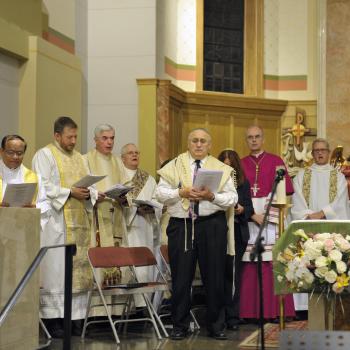Image: Good Housekeeping Magazine cover, 1908 / via Wikipedia
Over at Pray Tell, they’ve posted a reflection by Msgr. M. Francis Mannion, from Catholic News Agency, wherein he rhapsodizes about the domestic church and the joys of housework, as reflected in Kathryn Allen Rabuzzi’s “The Sacred and the Feminine: Toward a Theology of Housework”:
I recommend this book (published in 1982, but still in print) to anyone looking for an insightful understanding of housework and the task of homemaking.
Rabuzzi’s thesis is that women who do housework are, whether they know it or not, doing something religious. Housework, she says, represents a participation in one of the most fundamental of human roles–that of bringing order out of chaos and turning the world into a more friendly and benevolent place.
In the tasks of cooking, cleaning, washing, and ironing, the mother is ritualizing in a simple way the innate desire of the human person to bring order, harmony, and coherence to a universe in which chaos and disorder reign. She beautifies the home, and makes it good and holy. She is a maker of sacred space.
…This book can give encouragement to mothers who have chosen to remain at home and devote their full-time energy to homemaking. It is a wonderful exercise in the spirituality of the ordinary. It is particularly valuable in light of the cultural tendency to downgrade and undervalue the traditional role of homemakers.
You’d almost think domestic work had nothing to do with men. But I was reminded of one of my favorite spiritual teachers, Brother Lawrence, whose “The Practice of the Presence of God” remains a minor masterpiece—and a forerunner, in many ways, of the “little” theology of St. Therese of Lisieux.
From an essay about Br. Lawrence published in 2005:
Nicolas Herman, better known as Brother Lawrence of the Resurrection, was born in France in 1614. As a young man, he was wounded in military service. After recovering at home, he made a brief attempt to live in solitude as a hermit, but he soon abandoned it. He then decided to become a monk. In 1640, at the age of 26, he entered the Order of Discalced Carmelites in Paris as a lay brother and took the religious name of Lawrence.
For 15 years he worked as a cook in the monastery kitchen, at times cooking for over one hundred friars. In later life, due to severe sciatic gout, he was unable to stand for the many hours required to cook. He spent the remainder of his years as a sandal-maker for the barefooted Carmelites (a combination I still don’t understand!) until his death at the age of 77.
Although a monk, the disciplines of the cloistered life did not appeal to him. He tried to nurture his devotion to God through the set methods of the monastery – meditation, contemplation, silence, and written prayers. He found these methods overly complicated and personally ineffective. His inability to connect with God through these common monastic means led to the formation of his simple method of practicing God’s presence. He writes,
“I gave up all devotions and prayers that were not required and I devote myself exclusively to remaining always in his holy presence. I keep myself in his presence by simple attentiveness and a general loving awareness of God that I call ‘actual presence of God’ or better, a quiet and secret conversation of the soul with God that is lasting.” (Brother Lawrence, The Practice of the Presence of God: Critical Edition, 53)
In all things, Brother Lawrence sought to maintain a constant awareness of God’s gracious presence in his life. For this, this “practice of the presence of God” was “the essence of the spiritual life” (xxxiv). One of the best descriptions of his simple practice is found in his Spiritual Maxims:
The holiest, most ordinary, and most necessary practice of the spiritual life is that of the presence of God. It is to take delight in and become accustomed to his divine company, speaking humbly and conversing lovingly with him all the time, at every moment, without rule or measure, especially in times of temptation, suffering, aridity, weariness, even infidelity and sin. (36)
To this day, Br. Lawrence remains a vital witness to something too many of us neglect or overlook: the simple virtue of the simple life. I can’t help but think that when Paul advised the first Christians to “pray without ceasing,” he had something like the life of Br. Lawrence in mind. Make of your life a prayer!
So it should be for all of us. While Msgr. Mannion, taking his cue from Kathryn Rabuzzi, seems to have had women in mind in his essay, we shouldn’t forget that we are all called to praise God with our lives, even in the mundane acts of cooking, cleaning, scrubbing and sorting. Gender is irrelevant. It’s the living out of daily prayer that matters—whether in apron or overalls, with a rake or a dishrag. It’s not just for women to find the sacred in the ordinary—or to do it while cleaning around the house.
Brother Lawrence, God love him, pointed the way.













